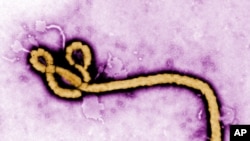A panel of independent experts has criticized the World Health Organization’s response to the Ebola crisis, saying the agency was not prepared and did not coordinate its activities with other organizations.
The panel was commissioned by the WHO Executive Board in January to come up with recommendations for better handling of global health emergencies.
This is only a preliminary report. The six independent experts are expected to release the final report in July; but, based on the current analysis, it is apparent that errors and misjudgments were made that prolonged and deepened the Ebola crisis in West Africa.
The chair of the panel, former Oxfam chief Barbara Stocking, said the WHO waited too long before declaring the Ebola epidemic in West Africa an international public health emergency.
“I think everybody is clear that it would have been preferable to have called a public health emergency earlier, but, there are many, many reasons…about why those judgments were extremely difficult to make…and in particular the great difficulty of getting hold of data…So, some very difficult circumstances to try to judge," said Stocking.
WHO Director-General Margaret Chan declared Ebola a public health emergency in August 2014, six months after the virus was discovered in Guinea and nine months after the first case occurred in December. By then, there were more than 1,700 confirmed and suspected cases of the disease and 932 deaths in Liberia, Sierra Leone and Guinea.
Stocking says it is essential the international health regulations that aim to help nations prevent and respond to acute public health risks be strengthened. She said this means countries must raise their level of preparation so they can respond quickly to an emergency.
“Part of that preparedness though is one bit that we know was particularly problematic in the Ebola crisis, and that is getting communities on board; getting communities understanding and their awareness of Ebola," said Stocking. "We really believe that that was not done well enough in the early days of Ebola.”
For example, Stocking notes the WHO did not coordinate well enough with local or international aid groups to help explain why burial rituals and other traditional practices were adding to the Ebola fatality rate and needed to be changed.
She said the panel believes the WHO should collaborate more closely with organizations such as Doctors Without Borders and use their expertise to deal with public emergencies. She said the panel of experts also recommends a global health emergency task force be established and put on standby to respond to disease outbreaks.
She said the economic impact of an outbreak such as Ebola can be devastating for poor countries. She said this acts as a disincentive for countries to declare they have the disease, as it might discourage other nations from trading with them.
To counteract that, Stocking says the panel is considering putting an insurance system in place to financially compensate countries that respond adequately to a health crisis.




